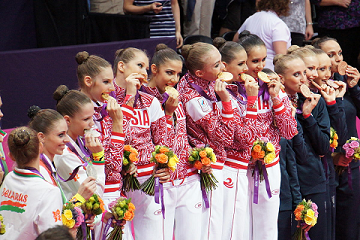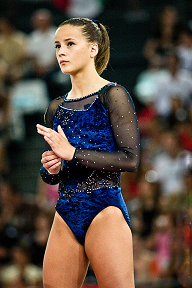The Real Poop


The Real Poop

We fully expect that if you came to this page, you can do an Arabian double front flip across the room into your chair. Blindfolded. If not, then we hope you can touch your toes while you daydream about Olympic glory in this great sport.
In all seriousness, gymnastics is a sport that requires its participants to be agile, flexible, strong, and dedicated. But you knew that already. You've been tumbling since the age of two, right (source)? Even if you were a late bloomer, and didn't begin classes until the ripe old age of seven, you are undoubtedly aware of the commitment that this sport requires.
Gymnastics is different from most other NCAA sports. Football, basketball, and volleyball NCAA athletes use their years playing college ball to refine their skills and, if they're in the 0.00001% of the crème de la crème de la crème, attempt to nail down a pro contract.
As a gymnast on an NCAA team, you are either just now reaching the peak of your career, or you're rocking that post-Olympics glow. That's right; if you're fortunate enough to continue your gymnastic career at this level, there's a good chance that you'll be competing against recent Olympians. The ones who aren't off using their unfair advantage to win celebrity dance competitions anyway.
Now, before you make plans to go vaulting with the stars, we want to explain how gymnasts get to this stage of their careers. As with many individual sports, including video games, there are a series of ten levels that gymnasts must pass through in order to be considered elite athletes. In levels one through seven, a gymnast is given a foundation of skills to master. Upon reaching level eight, a gymnast may begin incorporating his or her own skills and tricks with minimal to no restrictions (source).
TL;DR:
a level-one gymnast is still learning to do splits better than this one-year-old, while an elite gymnast is off competing for world championships.
Since most elite gymnasts are thirteen to seventeen years old, most NCAA programs are only looking for athletes that have a skill set ranging from level nine and up (source). Unless they're harboring some secret Katniss Everdeen moves, most gymnasts are well aware of their status by the time they start to consider college options. The serious ones know all the skills they have to master to get in, and the less serious ones are stuck on their ABCs (source). No different for the dudes (source).

Let's be honest; you're probably not going to be able to whip yourself into NCAA shape without having some serious formal gymnastics. That whole Loser-to-Ace narrative only happens on TV. And in the movies.
Even if you're more ripped then the entire football team, look better in a swimsuit than all the Miss Americas combined, and have competed at the club level for over a decade, you still might not make the cut. In 2013, there were ninety NCAA programs in total, Div I through Div III. Those ninety programs provided 2,006 slots for gymnastics hopefuls.
Guess how many high school gymnasts were competing for those spots?
21,472 in the United States alone (source).
At best, only 9% of high school gymnasts make it onto an NCAA team. The real number is actually even lower, given that many gymnasts opt to train at a club instead of competing on a high school team. It also does not take into account the number of foreign gymnasts accepted into NCAA programs, and the number of current NCAA players who are simply moving through their four years in a given program.

Interested in pursuing NCAA gymnastics for a scholarship, instead of for the outfits? Well, we've got news for you: the odds are not in your favor (source). As if competing for an NCAA roster spot weren't competitive enough, earning a scholarship is far more competitive. For 2013, there were 917 scholarships available for all 2,006 participants (source). (A more detailed breakdown can be found in our "Men's vs. Women's Gymnastics" section.)
By doing some simple rounding and dividing, we learn that only 4% of the 21,472 high school gymnasts earned a scholarship in 2013.
We don't like these odds. Are you willing take that kind of chance on your academic and, ultimately, professional and financial future?
We can't, in good conscience, encourage you to do so. However, here is a little advice if you do decide to pursue NCAA gymnastics fame.
- Start the recruiting process early. Involve your club coaches and any other resources at your disposal to help you go big and then go home.
- Beat other people. You will need to podium in regional, state, and national competitions. We think it would be a good idea to keep track of your scores and skills every time a competition ends, since you need to show progress.
- Decide if you're going to be an all-around gymnast or a specialist, and then hone your skills until they shine.
- Make a bangin' skills video. The initial recruitment process starts with video footage of what you can do, so sell yourself well (source).
- Do your homework and study hard. You will need to maintain the GPA necessary to get into the college of your athletic dreams…and ensure you'll have a job when your gymnastics career inevitably ends early. People tend to burn out by their mid-twenties.
- Make sure you are in peak physical and mental condition throughout your high school years. In other words, surround yourself with the right people who know how to motivate and help you grow into the athlete you want to become. We don't expect teenagers to get it right all the time, but we do expect adults to.
- Be willing to miss out on all the fun stuff your friends are doing instead of training, like partaking in that Friday night pizza with your bros. You've got to maintain weight.

Don't get us wrong. While we're honest about the itsy bitsy odds of your making it onto an NCAA team as you gracefully retire from your Olympic career, we will certainly bask in the glory of your accomplishment if you do.
Just be prepared to risk a career-ending injury during your twenty hours of practice a week (if those coaches actually abide by practice rules…), while staying on top of your classes and competing every weekend during competition season. For many gymnasts, these competitions and practices are a welcome break from the rigor and isolation they experience getting to this point in their careers (source). But it's also a soul-stomping amount of work.
If an NCAA career in gymnastics doesn't materialize or you wind up valuing Friday nights out and pizza more than rockin' the beam, we encourage you not to worry. Stay in school and stay in shape. You might just find those years of ring stunts and flips have prepared you for a worthwhile career as a stunt performer.
Shoot for the stars…just make sure to grab the bar on your way back down.